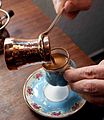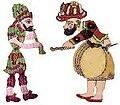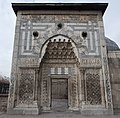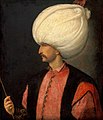Merhaba! Türkiye portalına hoş geldiniz. Hi! Welcome to the Turkey portal.
 | |

| |
Turkey, officially the Republic of Türkiye, is a country mainly located in Anatolia in West Asia, with a smaller part called East Thrace in Southeast Europe. It borders the Black Sea to the north; Georgia, Armenia, Azerbaijan, and Iran to the east; Iraq, Syria, and the Mediterranean Sea to the south; and the Aegean Sea, Greece, and Bulgaria to the west. Turkey is home to over 85 million people; most are ethnic Turks, while ethnic Kurds are the largest ethnic minority. Officially a secular state, Turkey has a Muslim-majority population. Ankara is Turkey's capital and second-largest city, while Istanbul is its largest city and economic and financial center. Other major cities include İzmir, Bursa, and Antalya.
Turkey was first inhabited by modern humans during the Late Paleolithic. Home to important Neolithic sites like Göbekli Tepe and some of the earliest farming areas, present-day Turkey was inhabited by various ancient peoples. The Hattians were assimilated by the Anatolian peoples, such as the Hittites. Classical Anatolia transitioned into cultural Hellenization following the conquests of Alexander the Great; Hellenization continued during the Roman and Byzantine eras. The Seljuk Turks began migrating into Anatolia in the 11th century, starting the Turkification process. The Seljuk Sultanate of Rum ruled Anatolia until the Mongol invasion in 1243, when it disintegrated into Turkish principalities. Beginning in 1299, the Ottomans united the principalities and expanded; Mehmed II conquered Istanbul in 1453. During the reigns of Selim I and Suleiman the Magnificent, the Ottoman Empire became a global power. From 1789 onwards, the empire saw a major transformation, reforms, and centralization while its territory declined.
In the 19th and early 20th centuries, persecution of Muslims during the Ottoman contraction and in the Russian Empire resulted in large-scale loss of life and mass migration into modern-day Turkey from the Balkans, Caucasus, and Crimea. Under the control of the Three Pashas, the Ottoman Empire entered World War I in 1914, during which the Ottoman government committed genocides against its Armenian, Greek, and Assyrian subjects. Following Ottoman defeat, the Turkish War of Independence resulted in the abolition of the sultanate and the signing of the Treaty of Lausanne. The Republic was proclaimed on 29 October 1923, modelled on the reforms initiated by the country's first president, Mustafa Kemal Atatürk. Turkey remained neutral during most of World War II, but was involved in the Korean War. Several military interventions interfered with the transition to a multi-party system.
Turkey is an upper-middle-income and emerging country; its economy is the world's 17th-largest by nominal and 12th-largest by PPP-adjusted GDP. It is a unitary presidential republic. Turkey is a founding member of the OECD, G20, and Organization of Turkic States. With a geopolitically significant location, Turkey is a regional power and an early member of NATO. An EU candidate, Turkey is part of the EU Customs Union, CoE, OIC, and TURKSOY.
Turkey has coastal plains, a high central plateau, and various mountain ranges; its climate is temperate with harsher conditions in the interior. Home to three biodiversity hotspots, Turkey is prone to frequent earthquakes and is highly vulnerable to climate change. Turkey has a universal healthcare system, growing access to education, and increasing levels of innovativeness. It is a leading TV content exporter. With 21 UNESCO World Heritage sites, 30 UNESCO intangible cultural heritage inscriptions, and a rich and diverse cuisine, Turkey is the fifth most visited country in the world. (Full article...)
Selected article -
TCG Heybeliada (F 511) is the lead ship of the Ada-class ASW corvettes of the Turkish Navy. Heybeliada was named after Heybeliada Island, where the Turkish Naval High School is located. Heybeliada Island is part of the Prince Islands archipelago in the Sea of Marmara, to the southeast of Istanbul. (Full article...)
General images
Did you know -
- ... that modern nursing was founded by Florence Nightingale at the Selimiye Barracks in Istanbul, Turkey during the Crimean War (1854-1856)? (May 22, 2007) Wikipedia:Recent additions 142
- ... that the British Levant Company avoided a fatal mistake of other chartered companies by paying their consuls and ambassadors a pension, so that they would not impose taxes on merchants for personal gain? (June 18, 2006) Wikipedia:Recent additions 72
- ... that footballer Hasan Ahmet Sari left Istanbul with his family after living through the 1999 İzmit earthquake? (August 18, 2011)
- ... that Khotyn Fortress

- ... that one of the accused assassins of Turkish former government minister Gün Sazak later hijacked an airplane to Bulgaria with accomplices? (February 21, 2014)
- ... that the Brig "Mercury" Attacked by Two Turkish Ships

- ... that the Galatasaray S.K. has origins from the Ottoman Empire era? (December 4, 2007) Wikipedia:Recent additions 190
Selected picture
Selected biography -
Kemal Derviş (Turkish pronunciation: [keˈmal dɛɾviʃ]; 10 January 1949 – 8 May 2023) was a Turkish economist and politician who was head of the United Nations Development Programme. He was honored by the government of Japan for having "contributed to mainstreaming Japan's development assistance policy through the United Nations". In 2005, he was ranked 67th in the Top 100 Public Intellectuals Poll conducted by Prospect and Foreign Policy magazines. He was vice president and director of the global economy and development program at the Brookings Institution and part-time professor of international economics at the Graduate Institute of International and Development Studies in Geneva.
In March 2015, Derviş agreed to become the Deputy Prime Minister of Turkey responsible for the economy in a cabinet led by Republican People's Party (CHP) leader Kemal Kılıçdaroğlu should his party form the government after the general election to be held in June. He declined to become a Member of Parliament however, stating that he would prefer to participate in the cabinet from outside the Parliament. (Full article...)
Selected video -
Selected quote -
| “ | Heroes who shed their blood and lost their lives! You are now lying in the soil of a friendly country. Therefore rest in peace. There is no difference between the Johnnies and Mehmets to us where they lie side by side here in this country of ours. You, the mothers, who sent their sons from far away countries wipe away your tears; your sons are now lying in our bosom and are in peace. After having lost their lives on this land they have become our sons as well. | ” |
Recognized content
Provinces
Related portals
Religions in Turkey
Neighbouring countries
Countries with related heritage
WikiProjects
Turkish wikipedia
 |
There is a Turkish version of Wikipedia, the free encyclopedia. |
Wikimedia
The following Wikimedia Foundation sister projects provide more on this subject:
-
Commons
Free media repository -
Wikibooks
Free textbooks and manuals -
Wikidata
Free knowledge base -
Wikinews
Free-content news -
Wikiquote
Collection of quotations -
Wikisource
Free-content library -
Wikiversity
Free learning tools -
Wikivoyage
Free travel guide -
Wiktionary
Dictionary and thesaurus










































































































